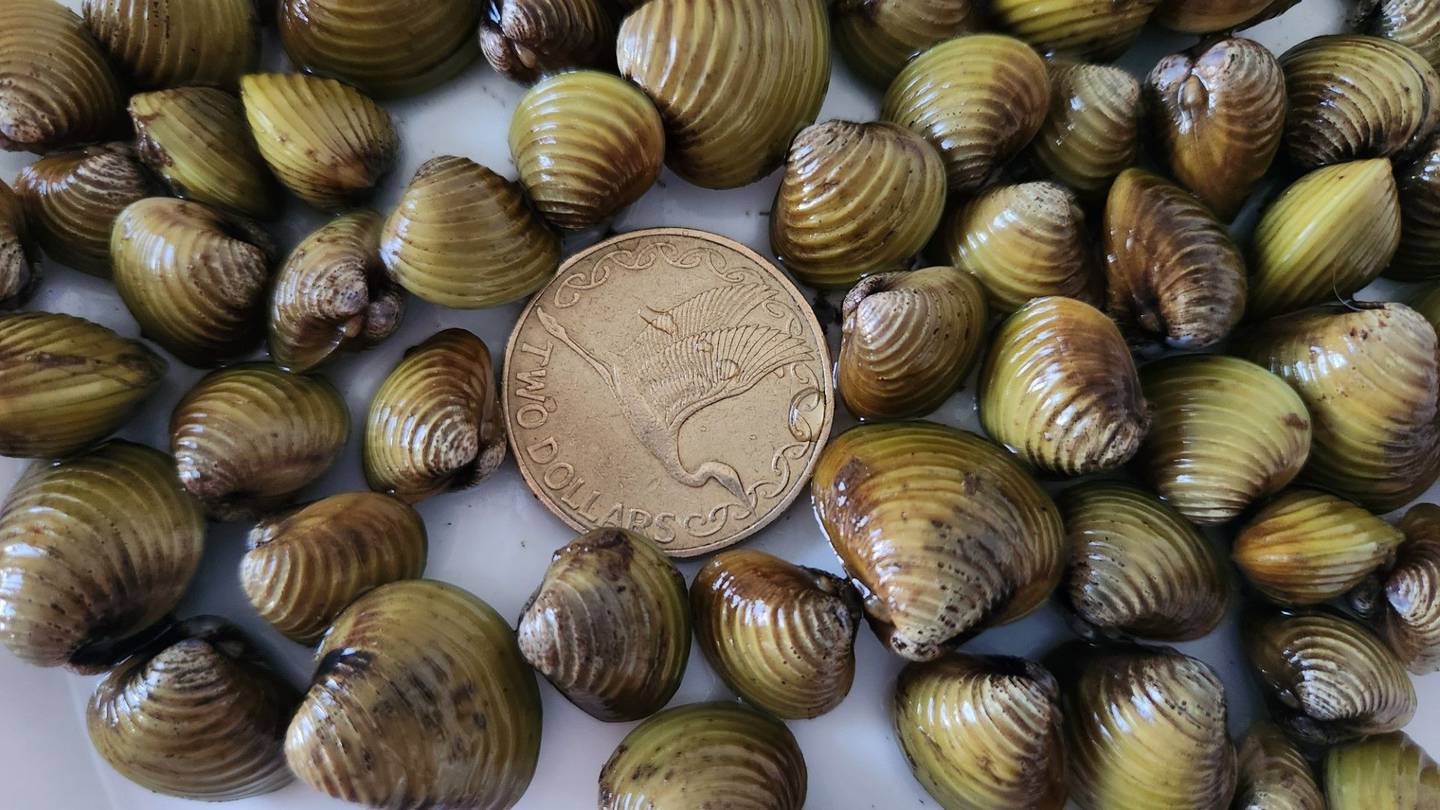Recently discovered along a stretch of the Waikato River in May this year, the Freshwater gold clam (Corbicula fluminea) poses a new threat to New Zealand waterways, native freshwater species and infrastructure.

Freshwater gold clam with coin for scale. Photo: Tracey Burton, Toitū Te Whenua - LINZ
Since its discovery, Biosecurity New Zealand has been conducting surveillance in the wider Waikato region and a targeted selection of lakes and rivers around the country.
To date, clams have only been found along a 45-kilometre stretch of Waikato River, from the Lake Karāpiro area to Hamilton. Testing for environmental DNA (eDNA) returned positive results on some water samples from Waikato River outside this area, but they are early results that need validating.
It is not yet known how this pest arrived in the country.
Here in Otago, ORC’s Biosecurity team have concerns this fast-spreading pest could hitch a ride from northern lakes and rivers to Otago’s lakes and waterways, ORC’s Manager Environmental Implementation Libby Caldwell says.
“Our worry is that people transporting recreational equipment such as boats and trailers, fishing gear, paddleboards, kayaks, or jet skis between the North and South Islands may inadvertently bring this new pest to Otago. That’s why we’re getting the word out now in the hope we can prevent a new aquatic pest from invading our lakes and rivers,” she says.
Freshwater gold clams can spread when they attach to boats or are carried in ballast water, used as bait, through the aquarium trade or carried further afield by water currents.
“It’s best practice to get in the habit of thoroughly washing down any recreational freshwater equipment, away from lakes and rivers. This method also takes care of a variety of other pests, like lagarosiphon and didymo,” she says.
If people think they have found freshwater gold clams, Mrs Caldwell asks that they take a photo and report the location to ORC or Biosecurity New Zealand (contact details below).
These freshwater clams can reproduce rapidly and form large populations which can clog water-based infrastructure such as electric generation plants, irrigation systems, and water treatment plants.
They are filter feeders and can potentially compete with native species for food. Juveniles will spread passively in the water column. In rivers, colonisation downstream is easily achieved as juveniles are transported by currents, or through being attached to floating vegetation.
What is Freshwater gold clam and why is it a pest?
The freshwater gold clam is native to eastern Asia and is widely established in North and South America and Europe.
They reproduce rapidly and form large populations.
It is not yet known how this species will respond to New Zealand conditions, but research indicates that the freshwater gold clam has a thermal tolerance of down to two degrees Celsius, which means that most of Otago is potentially occupiable for this species.
Overseas, this clam has been preyed on by some species of fish and crayfish, but despite that predation it has proved difficult to control and eradication has never been achieved.
If there is an incursion of this pest species into the Otago freshwater system, there are likely to be significant environmental and economic impacts.
Where to look out for this pest
- Freshwater gold clams are found in freshwater or brackish water (near river mouths), sitting on top of sandy or muddy surfaces, or buried shallowly within them.
- They can also be found among debris, such as leaves, that may have settled on the riverbed.
Help us ban the Freshwater gold clam from Otago
If you think you've seen the freshwater gold clam:
- note the location
- take a photo (if possible)
You can then either:
- freephone the Otago Regional Council on 0800 474 082,
- freephone Biosecurity New Zealand on 0800 80 99 66, or
- complete the online reporting form at Biosecurity NZ
More information and video
Freshwater gold clam surveillance, Waikato River - additional footage / photos can be requested from NIWA.
Freshwater gold clam - MPI
Freshwater gold clam - ORC
Contact ORC’s Biosecurity team: biosecurity@orc.govt.nz
Help stop the spread – Check, Clean, Dry
If you fish, swim, boat or row, follow the Check, Clean, Dry guidelines to help stop the spread of this clam to other rivers and lakes through New Zealand. Before moving to another location at the river, or to another river or lake:
Check
- Remove anything visible including clams, weed, or mud. Drain all water.
Clean
- Wash down your gear and craft with tap-water onto grass beside the river or lake, or at home – not into a stormwater drain system. This will flush off clams that can be too small to be seen.
- For gear made of absorbent materials (for example clothing, wetsuit), which will stay wet longer, you should do a hot wash (above 45 degrees) or pop it in a freezer until solid.
Dry
- Allow gear to dry to touch, inside and out, and then leave it to dry for at least 5 days before going back in a river or lake.
- Dry areas inside the watercraft where water has pooled, for example with an old towel, and then leave the craft to dry for at least five days. The hull of a watercraft will dry when towed.
